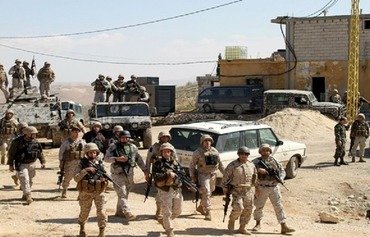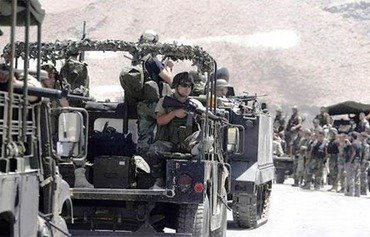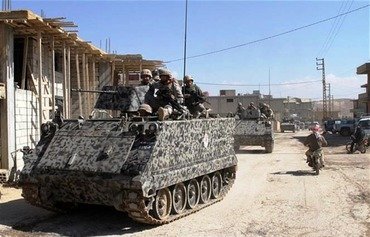Lebanese authorities recently arrested the "Islamic State of Iraq and the Levant" (ISIL) mastermind behind the deadly June 27th attack on the border town of al-Qaa , along with other members of his cell.
"In a qualitative, swift and pre-emptive operation, a Directorate of Intelligence special forces unit backed by army units deployed in the [Arsal] area launched a dawn attack on a post of the terrorist group ISIL in Wadi al-Araneb," the Army Command’s Orientation Directorate said in a November 25th statement.
"During the operation, army forces clashed with the group’s fighters using various types of weapons and managed to storm the base and arrest 11 fighters," the statement said.
Among them was "the dangerous terrorist and ISIL emir of Arsal Ahmad Youssef Amoun, who was gravely wounded", the statement said, adding that he "was previously involved in the rigging of car bombs in several areas in Lebanon", including Arsal and the southern suburbs of Beirut.
Lebanese forces also seized weapons, ammunition and explosive belts during the Arsal raid, the statement said.
A few days later, Lebanese forces arrested a prominent arms and explosives smuggler who supplied weapons to al-Qaeda-linked Abdullah Azzam Brigades.
On November 29th, Lebanese forces in Majdal Anjar "raided the house of Omar Hassan Kharroub, who is accused of supplying weapons and explosives to his fugitive brother Radwan", the Army Command’s Orientation Directorate said.
Radwan is a member of Abdullah Azzam and the "main suspect in a number of bombings", the directorate said, including a June 20, 2014, attack in Beirut's Tayyouneh district and a June 23, 2014, attack in Dahr al-Baydar.
Kharroub was arrested and a large quantity of ammunition and explosives were seized, along with an anti-aircraft missile, the directorate said.
Counter-terror successes
These successes are part of "the ongoing intelligence efforts aimed at eradicating terrorism", said Brig. Gen. Chamel Roukoz, a retired officer who is the former commander of the commando regiment that led the Arsal battles.
"The recent arrests, particularly of the Ahmad Youssef Amoun network, are of great importance because the latter is responsible for several terrorist attacks, including the al-Qaa bombings," he told Al-Mashareq.
Amoun apparently had many responsibilities, he said, adding that these will be revealed in the interrogations with him and other detainees.
"The solidarity of the people with the army, particularly the people of Arsal, enables the army and security forces to achieve successes in fighting terrorism," he said.
The arrest of Amoun and his network "was made possible by an information database compiled by the army’s Directorate of Intelligence from [information gleaned in] past interrogations of detainees, as well as the monitoring of his movements and targets", said strategic and security expert Brig. Gen. Nizar Abdel Kader, a retired Lebanese military officer.
The arrest of Amoun's cell and others like it are the result of heightened security measures designed to protect Lebanon from any wave of terrorism, especially in light of the current circumstances in neighbouring Syria, he told Al-Mashareq.
As for Kharroub, he is but one of many "who have profited from the war in Syria by trafficking weapons and explosives for financial gain", Abdel Kader said, adding that the weapons trade is booming on the Lebanon-Syria border.
Surveillance efforts bear fruit
The arrest of Amoun and his cell was the result of more than three months of surveillance and investigations into several incidents, including the al-Qaa bombings, said Ruba Munther, a journalist specialising in terror groups who writes for al-Joumhouria newspaper.
Lebanese forces were able to track the movements of Amoun, nicknamed "al-Sheikh", and locate his whereabouts, particularly a house he frequented on the outskirts of Wadi al-Araneb refugee camp near Arsal, she told Al-Mashareq.
According to high-ranking security sources, Munther said, Amoun initially joined al-Nusra Front (ANF), now known as Fatah al-Sham Front, and was involved in the Arsal battles of August 2014.
He later pledged allegiance to ISIL and was involved in several attacks, including attacks on army posts, and the planting of improvised explosive devices (IEDs), most recently in the Wadi Ata area on the night of October 17th, she said.
"Amoun has information on the soldiers kidnapped by ISIL ," Munther said, adding that "he was in charge of one of ISIL's most prominent military and security groups and possesses secrets about ISIL's structure in Arsal and its bases, fighters, types of weapons and plans".

![A Lebanese soldier overlooks the border town of Arsal, where the army recently arrested an 'Islamic State of Iraq and the Levant' terror cell. [Photo courtesy of the Army Orientation Directorate]](/cnmi_am/images/2016/12/20/6827-Lebanon-arsal-army-600_384.jpg)






